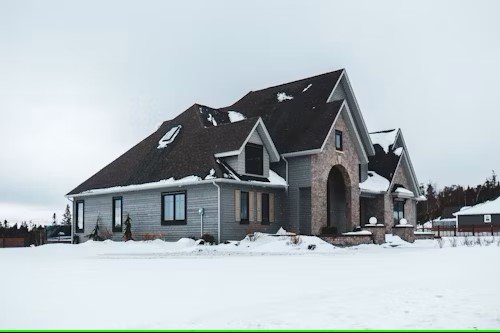
How Much Does It Cost To Build A House in Canada?
Building your own home is a deeply personal and exciting journey. For many Canadians, it’s a way to finally get the space, design, and lifestyle they’ve always dreamed of—without settling for whatever’s available on the resale market. But let’s be real: it’s not cheap.
The cost of building a house in Canada has risen sharply in recent years. Inflation, material shortages, skilled labour demand, and regulatory hurdles have all pushed up prices. That said, if you’re financially prepared and know what to expect, building your own home can still be an incredibly rewarding investment.
In this guide, we’ll walk you through the key costs—from land and permits to construction materials and custom finishes—so you can build smarter and avoid surprise expenses.
What Makes Building a Home So Expensive in Canada?
It’s not just the bricks and concrete. The price tag of a custom-built home includes everything from land acquisition to financing, government fees, labour, weather delays, and environmental assessments.
For example, someone building in downtown Toronto will pay vastly more for land, labour, and permits than someone building in small-town Saskatchewan. Weather also plays a major role—harsh winters can delay progress and add thousands in holding and labour costs.
To give you a sense of just how wide the range can be, here’s a breakdown of estimated building costs across major Canadian cities:
| City | 1,000 sq.ft Home | 2,000 sq.ft Home | 3,000 sq.ft Home |
|---|---|---|---|
| Vancouver | $315,000 | $630,000 | $945,000 |
| Calgary | $240,000 | $480,000 | $720,000 |
| Toronto | $280,000 | $560,000 | $840,000 |
| Ottawa | $225,000 | $450,000 | $675,000 |
| Montreal | $205,000 | $410,000 | $615,000 |
| Halifax | $165,000 | $330,000 | $495,000 |
What’s Included in These Costs?
A lot. And every piece matters.
When calculating the cost of building a house in Canada, you’re looking at more than just walls and floors. Land is the first hurdle. Depending on the city, land alone could cost more than $500,000—especially in places like Vancouver or Toronto. On top of that, you’ll need permits, a construction mortgage, labour, materials, and customized features.
Let’s look at each major component more closely.
Land & Site Prep
You’ll need to buy a lot zoned for residential use. The cost varies dramatically based on location, size, and services (like access to water or sewage). Once you own the land, a professional survey is required to verify boundaries and ensure no overlap with neighbours. This alone can cost $1,500 to $6,000.
🗺️ Land Cost Factors That Affect Your Home Build
- Location & Demand: Urban lots or areas with infrastructure access cost significantly more.
- Zoning Laws: Residential-zoned land is more desirable (and more expensive) than agricultural or commercial.
- Topography: Sloped, rocky, or flood-prone lands require more site prep, raising total costs.
- Access to Utilities: Lots with water, sewer, electricity, and road access command a premium.
- Municipal Fees & Development Charges: Some regions charge tens of thousands in local development levies and service connections.
Construction Financing
Most people don’t pay for their home in cash. Instead, they get a construction mortgage—a special loan that releases money in stages as the house is built. You only pay interest on what’s drawn, and the final amount converts into a traditional mortgage once construction is complete.
But here’s the catch: lenders want detailed plans, budget breakdowns, and upfront proof you can pay interest-only during the build. Plus, your lawyer—not your builder—receives and releases funds. Expect higher scrutiny and upfront costs compared to a regular home loan.
📋 How Construction Mortgages Work in Canada
- Step 1: Get Pre-Approved – Lender assesses your credit, income, and project plans before approving your draw mortgage.
- Step 2: Progressive Funding (Draws) – Funds are released in stages as construction progresses (e.g., 15% after foundation, 40% after framing).
- Step 3: Interest-Only Payments – During the build, you only pay interest on funds used (not full principal).
- Step 4: Final Inspection – Upon project completion, a final appraisal confirms home value and condition.
- Step 5: Convert to Traditional Mortgage – Once completed, your loan becomes a regular mortgage with principal and interest payments.
Permits & Legal Fees
A building permit is mandatory, and costs vary wildly by city. Here’s a look at how fees differ across Canada:
| City | Approximate Permit Cost |
|---|---|
| Toronto | $199 |
| Vancouver | $3,000 |
| Montreal | $157 |
| Calgary | $400 |
| Ottawa | $100 |
| Halifax | $250 |
Don’t forget potential extra fees like zoning checks, environmental assessments, and tree-removal permits (yes, even the trees count!).
Labour, Materials, and Design
Construction labour can cost between $50 to $150 per hour. And that’s just the human side. Material prices—from concrete to steel to lumber—can fluctuate dramatically based on demand and global supply chains.
The more custom your home, the higher the cost. Want a cathedral ceiling or floor-to-ceiling windows? Prepare to pay extra.| Feature | Estimated Cost |
|---|---|
| Foundation | $50,000–$60,000 |
| Electrical System | $14,000–$16,000 |
| Roof | $5,000–$12,000 |
| Flooring | $5–$20 per sq.ft |
| Windows & Doors | $1,000–$3,500 each |
| HVAC | $14,000–$17,000 |
Why Costs Vary So Much Across Canada
Location plays a huge role in construction cost. For instance, in Quebec, the forestry industry helps lower lumber costs. Alberta has higher labour rates due to stronger job markets. And building codes in Ontario are stricter, leading to higher compliance costs.
Transportation costs, climate challenges, local regulations, and even access to tradespeople can shift your budget dramatically from one province to another.
🧱 Top 5 Regional Cost Drivers in Canadian Homebuilding
- 1. Land Prices: Densely populated cities like Vancouver and Toronto have the highest land acquisition costs in the country.
- 2. Labour Rates: Alberta and BC see elevated skilled labour demand, especially during peak seasons.
- 3. Materials Access: Coastal provinces often face import cost hikes due to freight charges and limited local supply.
- 4. Municipal Fees: Building permits and development fees vary widely—Vancouver’s can exceed $3,000.
- 5. Provincial Building Codes: Stricter regulations (e.g. in Ontario) increase compliance costs and inspection timelines.
Can You Cut Costs Without Cutting Quality?
- Yes—if you plan smart. Here are some ways Canadian homebuilders reduce costs:
- Choose a simple layout instead of a complex architectural design
- Use local materials to avoid shipping costs
- Build during shoulder seasons (spring or early fall) to avoid labour shortages
- Get multiple contractor quotes instead of hiring the first builder you meet
💡 5 Tips to Save on Construction Without Sacrificing Quality
- 📍 Choose a Simple Floor Plan: Avoid unnecessary corners and complex layouts that increase both material and labour costs.
- 🛠️ Source Local Materials: Reduce shipping and import costs by using regionally available supplies.
- 📦 Buy in Bulk: Negotiate discounts on bulk materials and fixtures early in the project.
- 🏗️ Build During Off-Peak Season: Labour costs may be lower in winter and shoulder months when demand dips.
- 📑 Stick to the Plan: Last-minute design changes drive up costs—finalize decisions early and commit to them.
How Long Does It Take to Build a House?
Generally, it takes about 8 to 10 months for a standard house. For custom builds, expect 12 to 16 months or more. That timeline depends on how fast you secure permits, your contractor’s availability, weather delays, and how many changes you make along the way.
🏗️ From Foundation to Finish – Canadian Build Timeline
| Stage | Estimated Duration | What Happens |
|---|---|---|
| 1. Pre-Construction | 1–2 months | Finalize design, secure permits, and prepare financing |
| 2. Foundation | 2–3 weeks | Excavation, footing, foundation pouring, curing |
| 3. Framing | 4–6 weeks | Walls, floors, roof framing, sheathing |
| 4. Enclosure | 3–4 weeks | Roofing, windows, exterior doors installed |
| 5. Rough-Ins | 4–6 weeks | Electrical, plumbing, HVAC installations |
| 6. Interior Finishes | 6–10 weeks | Insulation, drywall, painting, flooring, cabinets |
| 7. Final Touches | 2–3 weeks | Fixtures, landscaping, inspections, clean-up |
| 8. Completion & Possession | 1 week | Final walkthrough and handover |
If you’re planning to build and finance your new home, it’s crucial to understand the key terms in your mortgage agreement — check out this first-time buyer’s guide to mortgage terms.
What Are the Alternatives?
If building sounds overwhelming, consider buying a fixer-upper and renovating, or exploring rent-to-own options where part of your rent goes toward future ownership.
In some cities, demolishing a small bungalow and rebuilding can be more cost-effective than starting from scratch on an empty lot.
Final Thoughts: Is Building a House in Canada Worth It?
It depends on your goals. If you want full control over your layout, energy efficiency, and finishes—and are ready for a longer, more hands-on process—then yes, building your own home can be incredibly satisfying.
Just remember: costs add up quickly. Every detail, from permits to paint, will impact your budget. But with the right mortgage advisor, builder, and plan, your dream home doesn’t have to stay a dream.
📞 Talk to a Mortgage Expert – Get Pre-Approved for a Builder’s Mortgage
Ready to build your dream home? Our commission-free mortgage specialists can help you secure the best construction financing options in Canada.
Get Started NowStuck with a Mortgage Decision?
Don’t stress — our team is here to help. Reach out for free, no-obligation guidance.
Contact the Experts



